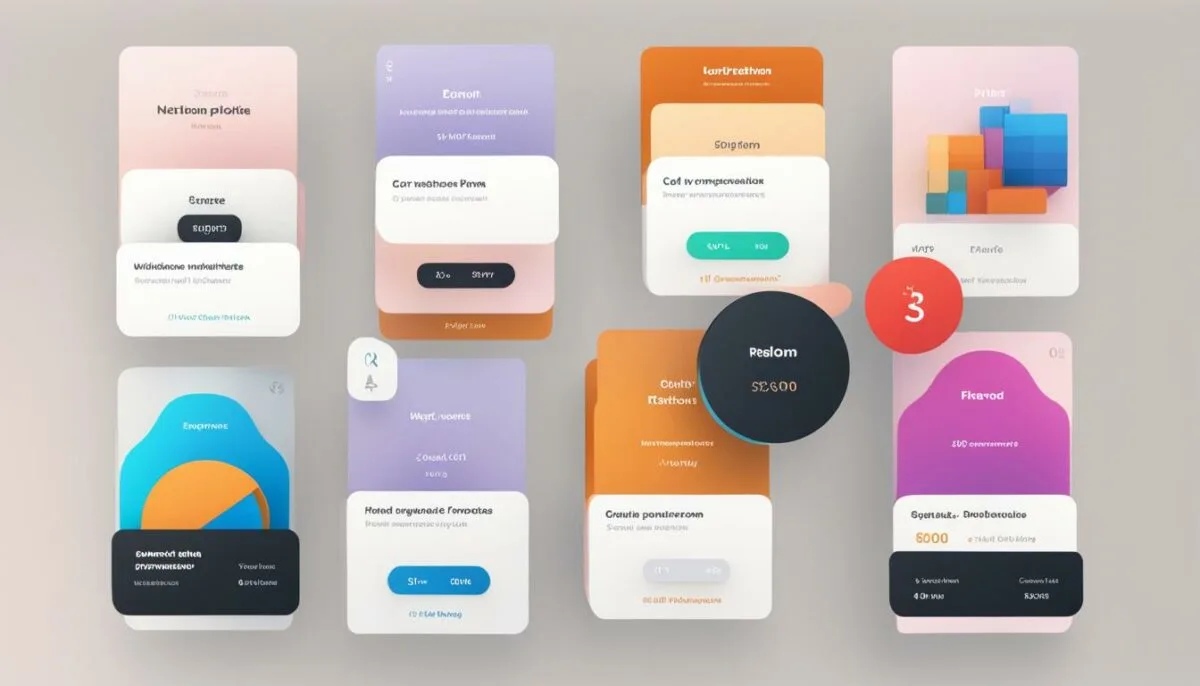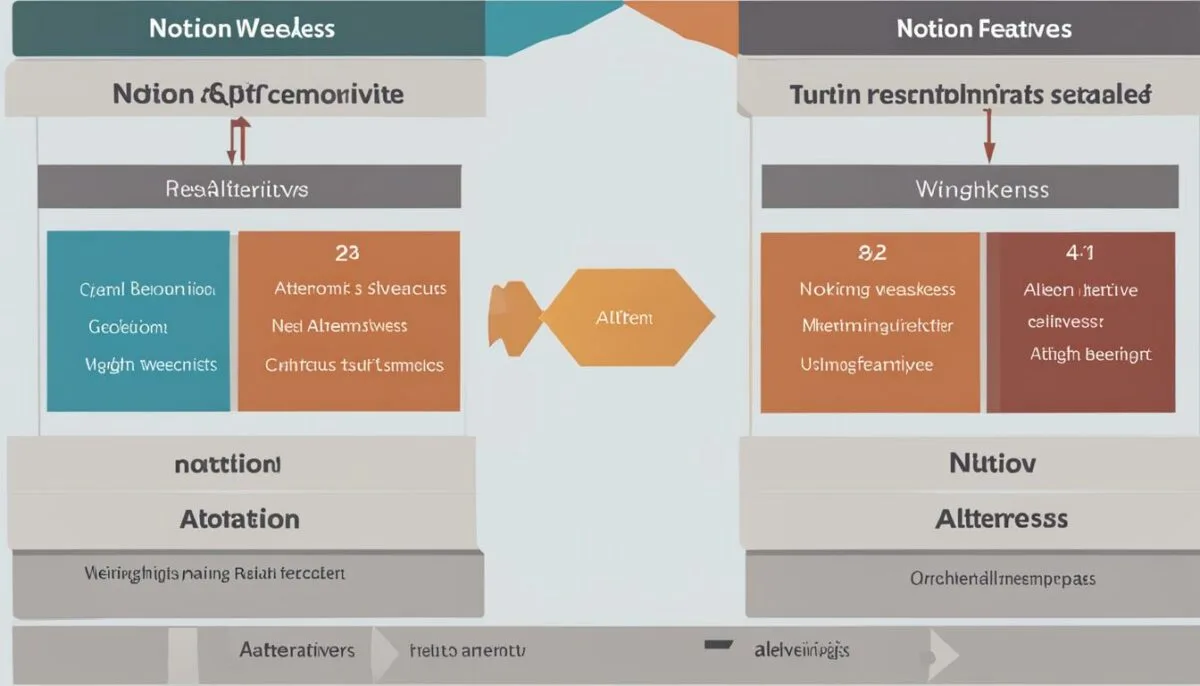Notion is a popular productivity app that has garnered a lot of attention in recent years. If you’re considering using Notion, you may be wondering if it’s free or if there are any costs associated with using the app. In this section, we will explore the features of Notion and answer the burning question: is Notion free?
Notion is a versatile application that allows you to manage your tasks, projects, notes, and more all in one place. It offers a range of features that can help boost your productivity and organization. However, the pricing structure of Notion can be a bit confusing for some users.
So, is Notion free? The short answer is yes! Notion does offer a free version of its app that includes many of the basic features you need to get started. However, there are some limitations to the free version that may make it less suitable for some users.
Key Takeaways:
- Notion is a popular productivity app that allows you to manage your tasks, projects, notes, and more all in one place.
- The pricing structure of Notion can be a bit confusing for some users.
- Notion does offer a free version of its app that includes many basic features.
- There are some limitations to the free version that may make it less suitable for some users.
- However, there are paid plans offered by Notion that come with enhanced features and functionalities.
Understanding Notion Pricing
Notion is a popular productivity app that offers a range of features to help users stay organized and efficient. While the app is free to use, there are also paid plans that offer enhanced functionality and perks.
The Free Version of Notion
The free version of Notion is a great starting point for users who want to try out the app before committing to a paid plan. It offers a range of powerful features, including:
- Unlimited pages and blocks
- Collaboration with up to 5 team members
- Syncing across devices
- Pre-designed templates for various use cases
- Integration with popular apps like Slack and Google Drive
While the free version of Notion is robust, there are some limitations to keep in mind. For example, advanced features like version history and the ability to create a personal workspace are only available on paid plans. Additionally, the free version has a file upload limit of 5MB, which may be restrictive for some users.
Paid Plans: Personal, Team, and Enterprise
Notion offers three paid plans: Personal, Team, and Enterprise. Each plan comes with its own set of features and pricing, as shown in the table below:
| Plan | Price (per user per month) | Features |
|---|---|---|
| Personal | $4 | Unlimited file uploads, version history, offline access, advanced blocks, and more. |
| Team | $8 | All Personal features, plus unlimited team members, admin tools, permissions and guests, and more. |
| Enterprise | Contact for pricing | All Team features, plus tailored onboarding and migration, priority support, and advanced security and compliance. |
Each paid plan offers a range of benefits that may be appealing to different types of users. For example, the Personal plan is ideal for individuals who want to take advantage of advanced features like version history and offline access. The Team plan is well-suited for teams that need to collaborate on projects and share knowledge. The Enterprise plan is designed for large organizations that require advanced security and compliance measures.
Notion also offers discounts for students and educators, as well as non-profit organizations. Additionally, users can save money by opting for an annual subscription instead of paying on a monthly basis.
Whether you’re a solo user or part of a team, Notion’s pricing structure offers a range of options to suit different needs and budgets. By weighing the benefits of each plan and considering your own workflows and priorities, you can determine which plan is right for you.

Exploring Notion’s Free Features
Notion offers a plethora of features in their free version. Let’s take a closer look at some of the key functionalities that can help boost productivity and organization.
- Note-taking: Notion’s note-taking capabilities are robust, allowing you to create pages, sub-pages, and databases to store all your notes in one place. You can also use templates, which we will discuss later, to streamline note-taking for specific purposes.
- Task Management: Notion’s task management capabilities allow you to create to-do lists, set reminders, and track progress. You can also add tags and due dates to tasks for easy identification and prioritization.
- Project Management: Notion’s project management capabilities include task boards, Gantt charts, and calendars, allowing you to visualize your projects and stay on track. You can also use databases to manage project-related data.
- Collaboration: Notion’s collaboration features enable you to share pages and databases with others, assign tasks, and communicate with team members in real-time. Notion’s commenting system allows for seamless collaboration and feedback.
Notion’s free version also includes integrations with popular tools such as Google Drive, Dropbox, and Slack. Keep in mind that there are some limitations to using the free version. For example, you are limited to 5MB file uploads and are unable to use certain premium features such as custom templates and version history.
When compared to other productivity apps such as Trello or Asana, Notion offers a unique set of features that make it stand out. However, it’s always good to explore alternative productivity apps to determine which one aligns best with your needs and preferences.
Notable Alternatives to Notion
| Productivity App | Features | Pricing |
|---|---|---|
| Trello | Task management, team collaboration, customizable boards | Free; $9.99/month for Business Class; $17.50/month for Enterprise |
| Asana | Task management, team collaboration, project planning, calendars | Free; $10.99/month for Premium; $24.99/month for Business |
| Evernote | Note-taking, task management, document scanning | Free; $7.99/month for Premium; $14.99/month for Business |
While these apps offer similar functionalities to Notion, they differ in terms of interface, user experience, and pricing. It’s important to try out different productivity apps to determine which one works best for you.

Notion Templates: A Free Resource
One of the standout features of Notion is the wide range of templates available to its users. These pre-designed templates are a useful resource to kickstart productivity and organization, and they offer a great starting point for customizing your workspace.
Exploring Notion’s Template Gallery
Notion’s template gallery offers a diverse range of options for different use cases. From project management to personal goal tracking, users can find a template that suits their needs. The gallery is easily accessible from within Notion and can be browsed by category or searched by keyword.

Some notable templates available in the gallery include:
| Template | Use Case |
|---|---|
| Agenda | Meeting organization and note-taking |
| Personal CRM | Contact management and organization |
| Content Calendar | Editorial planning for content creators |
| Reading List | Tracking and organizing books to read |
Customizing Templates to Suit Your Needs
While Notion’s templates are designed to be helpful right out of the box, they can also be fully customized to suit individual preferences. Users can add and remove sections, modify field names, and adjust the layout to create a personalized workspace.
Tip: If you’re new to Notion, starting with a template is a great way to familiarize yourself with the app’s functionality and features.
Creating Your Own Templates
Notion also allows users to create their own templates. This is particularly useful if you find yourself regularly creating similar pages or databases. Once you’ve designed your template, you can save it for future use or even share it with others.
Creating your own template is easy. Simply create a page or database with the fields and sections that you want to reuse, then click on “Templates” in the top right corner of the page and select “Save as Template.” You can then name your new template and add it to your template gallery.
Notion Templates: A Powerful Tool for Productivity and Organization
Overall, Notion’s template gallery is a valuable resource for boosting productivity and organization. The templates offer a starting point for customizing your workspace, and they can save time and effort in setting up new pages and databases.
Whether you’re a freelance writer, a project manager, or a student, Notion’s templates can help you stay on top of your tasks and goals.
Unveiling Notion’s Freemium Model
Notion is a popular productivity app that offers a range of features to enhance your workflow and organization. One common question that users have is, “Is Notion free?” In this section, we will dive deeper into Notion’s pricing model to answer this question and discuss the benefits and limitations of the app’s freemium model.
The Free Version of Notion
Yes, Notion offers a free version that includes many robust features. With the free version, users get access to:
| Features | Free Version |
|---|---|
| Unlimited pages | ✔ |
| Sync across devices | ✔ |
| Web clipper | ✔ |
| Templates | ✔ |
| Collaboration with up to 5 guests | ✔ |
| File uploads (limited to 5MB per file) | ✔ |
| Integration with over 1000 apps through Zapier | ✔ |
While the free version of Notion offers an impressive set of features, there are some limitations to keep in mind. For example, the free version limits the number of guests you can collaborate with to five, and file uploads are limited to 5MB per file. Additionally, some advanced features, such as permission settings and version history, are only available in the paid plans.
The Paid Plans
Notion offers three paid plans: Personal, Team, and Enterprise. The Personal plan is priced at $5 per month, and the Team plan starts at $10 per member per month. The Enterprise plan requires a custom quote and includes advanced security and administrative features.
Here’s a breakdown of the additional features you get with the paid plans:
| Features | Personal Plan | Team Plan |
|---|---|---|
| Unlimited guests | ✘ | ✔ |
| Advanced permissions and version history | ✘ | ✔ |
| Priority support | ✘ | ✔ |
| Unlimited file uploads (up to 5GB per file) | ✘ | ✔ |
| Admin tools for team management | ✘ | ✔ |
| Integration with Google SSO, API access, and more | ✘ | ✔ |
The paid plans offer additional features and functionality that can be useful for power users and teams. For example, the Team plan includes advanced permissions and version history, which can be crucial for team collaboration. Additionally, the paid plans allow for unlimited file uploads and guests, which can be helpful for users who need to collaborate with larger teams or upload larger files.
Overall, Notion’s freemium model offers a robust set of features in the free version and provides additional value with the paid plans. Depending on your needs and budget, you can choose the plan that works best for you.

A Look at Notion’s Paid Plans
Notion offers a freemium model, where users can access the basic version of the app for free. However, for users who require advanced features and greater customizability, Notion provides paid plans.
Notion’s Pricing Tiers
Notion’s paid plans are structured into three different tiers:
| Personal | Team | Enterprise |
|---|---|---|
| $4/month | $8/member per month | Contact Notion for pricing |
| Enables unlimited pages and guests | Includes all personal features, as well as team collaboration and administration tools | Includes all team features, as well as advanced security and customization options |
The Personal plan provides unlimited pages and guests, making it suitable for individuals or solo entrepreneurs. The Team plan offers advanced collaboration and administrative tools, making it ideal for small to medium-sized teams. Finally, the Enterprise plan provides additional security and customization options, making it perfect for large organizations or enterprises.
Additional Features
There are several enhanced features available with Notion’s paid plans, including:
- Advanced permissions and controls
- Priority customer support
- Custom branding and domain
- API access and integrations
These features can greatly enhance the flexibility and functionality of the app, allowing users to customize their Notion experience to meet their specific needs.
Discounts and Offers
Notion offers a 25% discount for yearly billing on any of their paid plans. Additionally, Notion provides free upgrades to all students and educators who verify their academic status with Notion.

In conclusion, Notion’s paid plans offer advanced features and greater customizability, making them suitable for users with specific productivity needs. With three different tiers and several enhanced features, Notion provides a range of options for individuals, teams, and enterprises. Take advantage of Notion’s discounts and offers to make the most out of your Notion experience.
Notion Review: Users Share Their Experiences
When deciding whether Notion is the right productivity app for you, it’s essential to hear from other users who have tried it out. We’ve scoured the internet for reviews from real people who have used Notion, and here’s what we found:
“Notion has been a game-changer for me. Its flexibility and versatility allow me to organize my work and personal life in one place, and the template options make it easy to get started.”
“I’ve used a lot of productivity apps, but Notion is by far the most customizable. I love being able to tweak it to fit my needs precisely.”
Overall, users have been impressed with Notion’s flexibility, which allows them to design their own workspace and customize it based on their workflow and needs. Additionally, the wide range of templates has been a significant attraction for many, as it means they don’t have to start from scratch when organizing their ideas and tasks.
However, some users have found Notion’s learning curve to be steep compared to other productivity apps. Additionally, the lack of mobile optimization has been a sticking point for some, as it can make using Notion on-the-go challenging.
Notion vs. Alternatives: Which is Right for You?
While Notion has many fans, it’s essential to consider other productivity apps on the market to determine which one is the best fit for you. Here’s how Notion stacks up against some popular alternatives:
| Productivity App | Pros | Cons |
|---|---|---|
| Notion | – Highly customizable – Wide range of templates – Excellent for project management and note-taking |
– Steep learning curve – Limited mobile optimization |
| Todoist | – User-friendly interface – Simple task management – Good for individuals and teams |
– Limited integration options – Limited customization |
| Evernote | – Robust note-taking features – Good for research and writing – Available on multiple platforms |
– Expensive premium plan – Limited customization – Limited project management features |
As you can see, there are pros and cons to each productivity app, and the right choice depends on your individual needs and preferences. However, if you’re looking for a highly customizable platform that can help with project management and note-taking, Notion is an excellent choice.
Now that you know what users are saying about Notion and how it compares to other productivity apps, it’s time to put it to the test. In the next section, we’ll provide a step-by-step tutorial on how to get started with Notion!

Getting Started with Notion: A Tutorial
Notion is a powerful productivity app with a versatile interface that empowers users to streamline their daily routines and boost their organizational skills. In this tutorial, we’ll guide you through the steps to get started with Notion and highlight some of its key features.
Creating an Account
The first step to using Notion is creating an account. Head over to the Notion website and sign up for free. You can also download the app for desktop or mobile device from the same website.
Creating Your First Workspace
After creating an account, the next step is to create your first workspace. A workspace is like a virtual notebook; it contains pages and databases that you can customize according to your needs.
Tip: Notion provides several pre-designed templates that you can use to get started. These templates cover different purposes, such as project management, note-taking, and personal goal tracking. To use a template, click “Use Template” on the Notion homepage.
Exploring Notion’s Interface
Notion’s interface is highly customizable, but it can take some time to figure out how it works. Here are some key elements of the interface:
- Sidebar: This is where you can access your workspaces, pages, and databases.
- Pages: Pages are where you can write notes, create to-do lists, and store information. To create a new page, click the “+” icon in the sidebar and select “Page.”
- Databases: Databases are like spreadsheets where you can store and organize data. To create a new database, click the “+” icon in the sidebar and select “Database.”
- Blocks: Blocks are the building blocks of Notion’s interface. You can add different types of blocks to pages and databases, such as text, images, files, and more.
Customizing Your Workspace
Notion allows you to customize your workspace to suit your needs. Here are some ways to customize your workspace:
- Add Pages: To add a new page to your workspace, click the “+” icon in the sidebar and select “Page.”
- Drag and Drop: You can easily move pages and databases around by dragging and dropping them in the sidebar.
- Templates: Notion provides several pre-designed templates that you can use to get started. To use a template, click “Use Template” on the Notion homepage.

With these tips, you should be ready to start using Notion effectively and efficiently. Happy organizing!
Notion vs. Alternatives: Which is Right for You?
Notion is a powerful productivity app that offers a range of features to help you organize your life and work. However, it’s not the only app of its kind available in the market. There are several alternatives to Notion that offer similar features and functionalities. In this section, we will compare Notion to some of the most popular alternatives out there.
Trello
Trello is a project management tool that is similar to Notion in many ways. It offers an intuitive interface where you can create boards, lists, and cards to manage your tasks and projects. What sets Trello apart is its simplicity and ease of use. While Notion may take some time to get used to, Trello is straightforward and easy to understand.
However, Trello’s simplicity is also its weakness. It lacks the depth and complexity that Notion provides, which can be limiting for users who need more advanced features. Additionally, Trello’s free version has many limitations, with only basic features available.
Evernote
Evernote is a note-taking app that is often compared to Notion. It offers a range of features for creating and organizing notes, including tags, notebooks, and reminders. Evernote’s strength lies in its flexibility and versatility. It can be used for a variety of purposes, including work, personal, and education-related tasks.
However, Evernote also has some downsides. Its interface can be cluttered and overwhelming, and some users may find it difficult to navigate. Additionally, Evernote’s free version places many restrictions on users, including a limited number of devices that can be synced and a low limit on file uploads.
Google Keep
Google Keep is a simple note-taking app that is ideal for quick, on-the-go notes. It offers a range of features, including color-coded notes, reminders, and list-making capabilities. Google Keep’s minimalistic interface and ease of use make it a popular choice for users who only need basic note-taking functionality.
However, Google Keep may not be suitable for users who need more advanced features like project management tools or database capabilities. Additionally, its interface can be too simplistic for some, lacking the depth and complexity of Notion’s functionality.

As you can see, there are several alternatives to Notion that offer varying levels of functionality and versatility. Ultimately, the choice of app depends on your specific needs and preferences. If you’re looking for a powerful productivity tool with advanced features and customization options, Notion may be the best choice for you. However, if you prefer simplicity and ease of use, other apps like Trello or Google Keep may be more suitable.
Notion for Teams and Businesses
Notion isn’t just for individual users – it’s also a powerful tool for teams and businesses. With its robust set of features and customizable workspace structures, Notion can help streamline team collaboration, task management, and knowledge sharing.
One of the standout features of Notion is its flexibility in accommodating different team structures and workflows. Teams can create collaborative workspaces, complete with shared to-do lists, databases, and calendars. These workspaces can be customized to suit the specific needs of each team, with the ability to add or remove features as necessary.
Notion’s integrations with popular productivity tools such as Slack, G Suite, and Trello make it easy to incorporate Notion into existing workflows without causing disruptions. The app’s real-time synchronization ensures that all team members are always working with the most up-to-date information.
Notion Features for Teams and Businesses
Notion’s core features are valuable for any team, but the app also offers additional functionalities specifically tailored to teams and businesses.
| Feature | Description |
|---|---|
| Team Dashboard | A centralized view of all team workspaces and ongoing projects. |
| Shared Templates | Pre-designed templates that teams can use to jumpstart their collaboration efforts. |
| Permission Controls | A variety of roles and permissions for team members, ensuring that each person has access only to the relevant information. |
| Version History | A record of all revisions made to a workspace, allowing teams to revert to previous versions and maintain a clear audit trail. |
Notion also offers a team-specific pricing option, which is ideal for businesses with larger teams or more complex workflows. The team plan includes all of the features of the personal plan, plus additional team features such as advanced permissions and administrative controls.
Notion Alternatives for Teams and Businesses
While Notion is a standout app for team collaboration, there are several other productivity tools that businesses may want to consider. Here’s a quick look at some relevant alternatives:
- Asana: A popular task management app with robust project tracking features.
- Trello: A visual-oriented task management app that uses boards and cards to organize tasks.
- Microsoft Teams: A collaboration platform that includes chat, video conferencing, and file sharing features.
- Monday.com: A team management app with a flexible, customizable interface.
Ultimately, the right tool for a business or team will depend on a variety of factors such as team size, budget, and specific workflow needs. It’s always a good idea to test out a few options before committing to one.

Notion’s Growing Community: Tips and Tricks
Notion’s community of users is growing exponentially, and with it comes a wealth of knowledge and resources for maximizing the app’s potential. From online forums to social media groups, users are sharing tips, tricks, and hacks for boosting productivity and staying organized.
If you’re new to Notion, joining one of these online communities is a great way to get started. You’ll find a supportive network of users who are eager to share their experiences and help you navigate the app’s features. Whether you’re looking for inspiration for your next project or need help troubleshooting an issue, there’s no shortage of resources available.
Notable Notion Communities:
| Community | Description |
|---|---|
| Reddit r/Notion | A community of Notion users sharing tips, tricks, and templates. |
| Notion’s Twitter Community | Follow Notion’s official Twitter page for app updates and user stories. |
| Notion’s Discord Channel | Join the Notion community on Discord for real-time chat and support. |
Aside from online communities, Notion also offers a wealth of tutorials and guides for users looking to enhance their productivity. The official Notion website features an extensive knowledge base with step-by-step instructions and screenshots. Additionally, Notion’s YouTube channel offers video tutorials and showcases unique use cases for the app.
Whether you’re a seasoned Notion user or just getting started, taking advantage of the app’s growing community is an essential step in maximizing its potential.

Notion for Personal Productivity
Notion is a powerful tool that individuals can use to boost their personal productivity and stay organized. With a range of features tailored for personal use, Notion stands out as a versatile productivity app that can streamline your daily routines and help you achieve your goals.
Time Management
One of Notion’s key features is its ability to help users manage their time effectively. Its calendar view allows users to visualize their schedule easily, while its reminders and to-do lists can keep them on track throughout the day. Notion’s database feature can also be used as a timestamp to track the time spent on specific activities, providing insights into how to optimize one’s schedule.
Habit Tracking
Notion provides an innovative way to track and monitor personal habits, allowing users to set goals and track progress over time. By using a template or creating their own custom tracker, users can log their daily habits and monitor their progress towards meeting their goals. Notion’s database feature can also be used to create a running log of past activity, providing insights into trends and patterns that may be impacting personal productivity.
Goal Setting
Notion’s goal-setting features can help users define and track their personal goals, ensuring they stay motivated and on track towards achieving success. With customizable templates available, users can create personalized goal trackers for different areas of their life, such as health, career, and personal growth. Notion’s easy collaboration features also allow users to share their goals with peers and friends and seek accountability for their progress.
Notion Alternatives
While Notion offers many unique features tailored for personal productivity, there are alternative apps that may better suit certain users’ needs and preferences. Some popular alternatives to Notion include Trello, Asana, and Evernote, each providing different strengths and functionalities for personal productivity. Users can assess the features and limitations of each app and decide which best fits their individual needs.

In conclusion, Notion offers a range of features that can be leveraged for personal productivity. With its customizable templates, time-management tools, and habit-tracking features, Notion is a versatile app that can help individuals optimize their daily routines and achieve their personal goals. While Notion is an excellent choice for some, users should explore alternative apps and evaluate their unique needs to find the best fit for their personal productivity journey.
Notion for Education and Academia
Notion’s versatile features make it a valuable tool for educators, students, and researchers alike. Its flexibility allows customization to fit the needs of every individual user. Let’s explore how Notion can be utilized in the field of education and academia.
For Teachers
Notion offers various features that can streamline teaching workflows, project management, and lesson planning. Teachers can use Notion to:
- Create and share class schedules and lesson plans
- Organize course materials in a centralized location
- Track student progress with gradebooks and attendance trackers
- Collaborate with colleagues on shared projects and curriculums
Notion’s database functionalities enable teachers to collect, organize, and analyze data such as student feedback, assessment results, and attendance records.
For Students
Notion can help students stay organized and focused on their academic goals. Here are some ways students can use Notion:
- Create a personalized study plan and track progress
- Organize notes and course materials by subject or topic
- Collaborate with classmates on group projects and presentations
- Keep track of deadlines and submission dates
Notion’s integration with other productivity apps such as Google Drive, Evernote, and Trello makes it a powerful all-in-one tool for students.
For Researchers
Notion’s features can also benefit researchers in various fields. Researchers can use Notion to:
- Track and organize research data, notes, and sources
- Create a knowledge base for future reference
- Collaborate with co-authors and research partners
- Visualize research data using Notion’s database and visualization tools
Notion’s flexibility makes it suitable for research projects of any size and complexity.
Notable Alternatives
While Notion is a powerful tool for education and academia, it’s not the only option available. Other notable alternatives include:
| Productivity App | Notable Features |
|---|---|
| Evernote | Organized note-taking, web clipping, and task management |
| Trello | Visual task and project management using boards, lists, and cards |
| Google Drive | Cloud-based document storage and collaboration |
Each of these apps has its own unique features and benefits, and users should choose the one that best fits their needs.

Conclusion
In conclusion, we have answered the burning question that motivated this article: Is Notion free? We have explored its pricing structure, features, and user experiences to provide readers with an in-depth analysis of this popular productivity app.
Through our review of Notion, we have discovered that it offers a wide range of features and functionalities that can help boost productivity, both for personal and professional use. We have provided an objective analysis of the free version of Notion and its value proposition compared to paid plans.
Additionally, we have explored real user reviews of Notion and compared it to other popular productivity apps in the market. Through this analysis, readers can decide if Notion is the right choice for their needs and preferences.
Finally, we have touched upon various use cases and templates tailored for different purposes, such as team collaboration, education, and personal productivity. Notion offers a versatile and powerful platform that can adapt to different contexts and needs.
Ultimately, whether you’re an individual user or part of a team, in academia or the business world, Notion can help enhance your productivity and organization. So, go ahead and give it a try yourself!
FAQ
Is Notion free?
Yes, Notion offers a free version with a range of features that can help boost your productivity and organization. However, there are also paid plans available with enhanced features for those who require more advanced functionalities.
How much does Notion cost?
Notion offers different pricing plans, including a free version. The paid plans start at $4 per user per month when billed annually. There are also options for team and enterprise plans with custom pricing. It’s important to note that the exact pricing and features may vary, so it’s best to refer to Notion’s official website for the most up-to-date information.
What features are included in the free version of Notion?
The free version of Notion includes features such as unlimited notes, tasks, and projects, as well as collaboration and sharing capabilities. It also provides access to basic templates and integrations with popular tools. However, there may be limitations on storage space and certain advanced functionalities that are available only in the paid plans.
Can I customize Notion’s templates?
Yes, Notion allows users to customize its pre-designed templates to suit their individual preferences and workflows. You can modify the structure, layout, and content of the templates to better meet your specific needs. This flexibility makes Notion a versatile tool for a wide range of use cases.
How does Notion’s freemium model work?
Notion’s freemium model offers a free version of the app with basic features and limited functionalities. The goal is to provide users with a taste of what Notion can offer while enticing them to upgrade to a paid plan for access to more advanced features and enhanced capabilities. The paid plans provide additional value and support the ongoing development of the platform.
What are the paid plans offered by Notion?
Notion offers paid plans starting at $4 per user per month when billed annually. These plans come with extra features such as unlimited file uploads, enhanced collaboration tools, advanced permissions, and priority support. For teams and enterprises, there are also options for customized plans with added benefits.
What are users saying about Notion?
Notion has garnered positive reviews from users who appreciate its versatility, intuitive interface, and robust set of features. However, opinions may vary depending on individual needs and preferences. It’s always a good idea to explore user reviews and compare Notion to other productivity apps to determine if it aligns with your requirements.
How do I get started with Notion?
To get started with Notion, simply sign up for an account on their website. Once you have created your account, you can start creating workspaces, organizing your content, and exploring the various features within the app. If you need assistance, Notion also provides tutorials and guides to help you navigate the platform.
How does Notion compare to other productivity apps?
Notion offers a unique approach to productivity and organization, with its flexible structure and customizable features. While it may share some similarities with other productivity apps, it distinguishes itself through its versatility and powerful functionality. It’s recommended to compare Notion to other apps, considering factors such as pricing, features, and user experience, to determine which app suits your needs best.
Can Notion be used for team collaboration and business purposes?
Absolutely! Notion provides features that make it an excellent tool for team collaboration and business use. It offers functionalities such as shared workspaces, real-time editing, task management, and document collaboration. Notion can help teams streamline their workflows, share knowledge, and communicate effectively, making it a valuable asset for businesses of all sizes.
Are there any resources available to help me maximize my use of Notion?
Yes, Notion has a growing community of users who share tips, tricks, and best practices for using the app. There are online resources, forums, and social media groups where you can discover innovative ways to leverage Notion’s features. These resources can provide valuable insights and help you unlock the full potential of the app in your personal and professional life.
How can Notion enhance personal productivity?
Notion offers a wide range of features that can boost personal productivity. With tools for task management, habit tracking, note-taking, and goal setting, Notion can help individuals stay organized, manage their time effectively, and track their progress towards personal goals. Notion’s customizable structure allows users to tailor the app to their specific needs and preferences.
Can Notion be used in education and academia?
Yes, Notion can be a valuable tool in the field of education and academia. Teachers, students, and researchers can use Notion to stay organized, collaborate on projects, and manage their academic workflows. Notion’s flexibility and customizability make it suitable for creating study materials, organizing research notes, and collaborating on group projects.